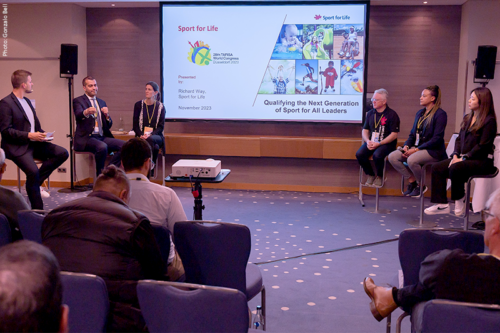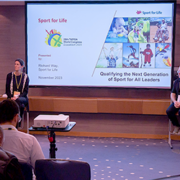Empowering the Next Generation: Insights from the 28th TAFISA World Congress
 Fresh from his trip to Pachuca, Mexico, as part of the Mexican Football Federation’s recent conference, Sport for Life CEO Richard Way shared Sport for Life’s impactful work around knowledge scaling and capacity building in the quality sport and physical literacy spaces at the 28th TAFISA World Congress in Dusseldorf Germany at the start of November. This year’s congress theme? Sport for All: More together than ever.
Fresh from his trip to Pachuca, Mexico, as part of the Mexican Football Federation’s recent conference, Sport for Life CEO Richard Way shared Sport for Life’s impactful work around knowledge scaling and capacity building in the quality sport and physical literacy spaces at the 28th TAFISA World Congress in Dusseldorf Germany at the start of November. This year’s congress theme? Sport for All: More together than ever.
Organized by the German Olympic Sports Federation, North-Rhine Westphalia State Sports Federation, and North-Rhine Westphalia State Government, the congress brought together 500 participants from more than 100 countries to discuss, debate, and experience the latest in the Sport for All movement, determining its future direction.
Sharing knowledge and expertise around sport and physical activity
As part of the session entitled “Knowledge and Expertise: Qualifying the next generation of Sport for All leaders,” Way joined a panel of four to share case studies on work across the sector. The session emphasized the role of youth in driving positive change through sports. The panel stressed capacity building, experience-sharing, and networking to equip Sport for All leaders with the tools needed for meaningful action. Way’s interactive presentation dove specifically into three main components of Qualifying the next generation of Sport for All leaders: the skills required for the next generation of Sport for All leaders, strategies to empower them, and the networks necessary to support their growth and success in the field.
Way also highlighted upcoming innovations in Sport for Life’s knowledge scaling department, aiming to broaden the scope of physical literacy and quality sports. The organization is leveraging cutting-edge methods to prepare the next wave of leaders to promote overall well-being through sport (stay tuned for those announcements in the coming months!).
Other panellists included Stacey Kim from TAFISA, Wiebke Fabinski of the German Olympic Sports Federation, and Mohamed Amine Zariat of TIBU Morocco.
“Sport for All: More together than ever signifies that our journey to building a healthier, inclusive world is not a solitary path. It’s a collective effort where capacity building forms the bridge to transform policies into impactful actions,” Kim said of the congress. “At TAFISA, we’re committed to making this a reality, working hand in hand with members like Sport for Life. Together, we empower the next generation, equipping Sport for All leaders with the knowledge, skills, and capacity to drive positive change and shape a future where Sport for All becomes a universal language of well-being and inclusion.”
What is the Sport For All movement?
The Sport For All movement is a global initiative that promotes and encourages people of all ages and abilities to participate in sports and physical activities. The movement’s primary goal is to make sports and physical recreation accessible to everyone, regardless of their background, gender, age, or physical condition. It emphasizes the numerous benefits of regular physical activity, including improved health, social interaction, and overall well-being. It aims to break down barriers to participation in sports and recreation and create inclusive environments where people feel welcome and comfortable engaging in physical activities.
The movement has gained global recognition, with many countries adopting policies to increase participation in sports and physical activities. TAFISA is the leading international Sport For All organization, and other international organizations, such as the International Olympic Committee (IOC) and the World Health Organization (WHO), actively support initiatives that align with the principles of Sport For All.
National and international organizations and governments often support and promote the Sport for All movement through various programs, events, and policies that encourage widespread participation in sports and physical activities. The ultimate vision is to create a culture where an active and healthy lifestyle is encouraged and accessible to everyone.
Through a commitment to innovation and collaboration around quality sport, physical activity, and physical literacy, coupled with global networks, we can collectively shape a healthier and more inclusive future.

